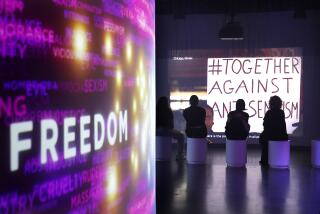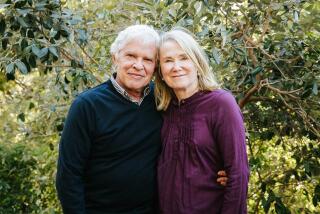Giesler’s Rise to Glory in L.A. Courts
- Share via
Before there was a Johnny L. Cochran Jr. and a Leslie Abramson, there was a Jerry Giesler.
In fact, his memory casts such a long shadow over Los Angeles’ defense attorneys that when the Criminal Courts Bar Assn. gathers each year, it honors an outstanding criminal lawyer with the Jerry Giesler Memorial Award.
Giesler’s clients ranged from murderers to film stars such as Charlie Chaplin and Lana Turner, and his celebrity rivaled even the best known of them.
He was particularly successful in the defense of clients caught in crimes of passion.
*
Giesler was hardly a casting director’s notion of a crack defense attorney. He was short and plump with a reedy voice. And, for a man who would become one of his era’s best known--and paid--advocates, Giesler had modest beginnings.
Born in Iowa, Harold Lee “Jerry” Giesler arrived in Los Angeles in 1907 and entered USC’s law school the next year. Running a collection agency while attending school, he called on renowned attorney Earl Rogers to collect a bill. Although Giesler failed to extract the delinquent payment, his methods so impressed Rogers that he hired Giesler on the spot. Giesler quit law school to become Rogers’ protege--completing his education by reading law in the famous attorney’s office. In 1910, he was admitted to the bar after an oral exam, which he later described:
“Since it was past the lunch hour, they only asked me two questions: What is your name and what is your address.”
The same year, before the advent of radio and television, Angelenos packed the courtroom to see Rogers defend attorney Clarence Darrow, who was accused of bribing the jury during his defense of J. B. McNamara, one of two brothers who bombed the Los Angeles Times. Rogers took Giesler along “to help carry the briefcases.” When Giesler was asked to look up a point of law he came back with 40 pages of research. And when Rogers went off during the trial on one of his frequent drinking binges, Giesler took over. His name quickly went up in gold leaf on Rogers’ office window.
“I felt like a New York Yankee batboy being told he was going to pitch in the World Series,” Giesler recalled.
Giesler rose to glory when he got an acquittal for theater magnate Alexander Pantages who was indicted on charges of statutory rape of a 17-year-old showgirl. He subsequently won hung juries and acquittals for the rich and famous including, actor Errol Flynn, director Busby Berkeley, mobster Benjamin “Bugsy” Siegel and stripteaser Lili St. Cyr.
“Get me Giesler,” became a laugh line in Hollywood hangouts.
*
“My clients don’t want justice,” he once said. “They want off.”
One of his most sensational cases involved 38-year-old Paul Wright, an aviation company executive and Glendale resident, who shot and killed his wife, Evelyn, 28, and John Kimmel, 36, an airline pilot.
The press called it the White Flame Murder because Wright said a white flame exploded in his head when he awoke in his bedroom to a single note repeated over and over on the piano, and then found his wife making love to his best friend on the piano bench.
Filled with uncontrollable rage, Wright got a pistol, walked back to the living room, and fired nine rounds at his wife and friend.
When he “came to his senses,” he called the police and said, “Get me Giesler.”
Giesler cut his usual $100,000 fee to a fraction because Wright had limited means and Giesler thought the case was so challenging.
To prove how it happened, Giesler brought the piano and bench into court. He had already consulted police photographs of the crime scene and spent hours with his wife, in the privacy of their home, trying to figure out how Kimmel was left dead on the floor with his left foot still on the piano’s keyboard. But all Giesler got trying to figure out the victims’ positions was a hurt hip when he fell off the bench. As he limped into court the next day everyone asked what happened, but he only smiled. Wright was convicted--but only of manslaughter.
In California at that time, insanity pleas were heard after the trial’s conclusion. At the subsequent hearing to determine whether Wright was insane when he killed his wife and her lover, Giesler reached deep into his bag of tricks. He argued that because the defendant was presumed innocent at trial, the prosecution bore the burden of proof and, therefore, was allowed the first opening statement and final closing argument. But now, the defendant bore the burden of proof of insanity. Accordingly, Giesler argued, he should be allowed the same privilege of opening and closing. With Giesler’s summation the last thing they heard, the jury found Wright insane at the time of the murder. Subsequently, a new set of psychologists found Wright had regained his sanity and set him free.
Giesler’s interests in life extended beyond the practice of law. In the late 1930s and early 1940s, boxing, wrestling and horse racing had an unsavory reputation. And Giesler aimed to give the sports respectability as chairman of both the state Athletic Commission and Racing Board.
In 1941, he was embroiled in a bitter drug-testing controversy when word leaked out that nine trainers were being held liable for traces of caffeine in the post-race tests of thoroughbreds running at Hollywood Park. Giesler was determined to press on with the investigation, no matter who was involved. But his intransigence prompted numerous protests.
*
A petition made the rounds calling for his ouster. Studio mogul Louis B Mayer, known for his incendiary temper, demanded that Giesler buy out his thoroughbred holdings. Others threatened to take their horses elsewhere.
But Giesler dug in his heels. “I say that if the investigation of the illegal stimulation of racehorses causes any owner to leave, then it is better for California that he is gone.”
In the end, Giesler’s efforts came to nothing over an issue he would have relished as a defense attorney--rampant contradictions in the results produced among the drug testing experts.
In more than 70 murder cases Giesler argued, no defendant was ever executed. Credit for that record may have been the only question on which Giesler was self-effacing. His mentor, he always said, was the real author of his success:
“Every day I remember something else that Earl Rogers taught me and I put it to use. What I learned from him has been priceless to me.”
After more than half a century of law practice, Jerry Giesler, Rogers’ great pupil and master of every courtroom he ever entered, died of a heart attack on New Year’s Day 1962.
More to Read
Sign up for Essential California
The most important California stories and recommendations in your inbox every morning.
You may occasionally receive promotional content from the Los Angeles Times.













